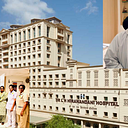Insights on Kidney Failure by Dr Sujit Chatterjee CEO Hiranandani hospital

Let’s talk about a significant health problem called kidney failure. It’s serious and needs attention so we will learn about it in this article. Our kidneys are super important — they clean our blood and help keep things balanced. But sometimes, they can have a big problem and stop working right. This is called kidney failure. It happens for different reasons like illnesses (diabetes and high blood pressure), medicines, infections, and things in our family history.
We’ll also talk about signs of kidney failure, like feeling tired, swelling, not peeing a lot, and feeling sick all the time. We’ll share ways to stop it from happening, like eating good food, drinking enough water, and moving around. If you ever have signs or think you might, it’s super important to see a doctor fast. Finding the problem early helps a lot in fixing it. So, understanding kidney failure helps us take good care of ourselves and stay healthy.
What is Kidney Failure?
As per Kidney Sujit Chatterjee Hiranandani Hospital Kidney, failure occurs when kidneys can’t do their job well, causing significant health issues. The kidneys play a crucial role in cleaning your blood and maintaining balance in the body. However, they can become weak, leading to difficulties in getting rid of waste and managing essential functions. Various reasons, such as frequent illness (especially with diabetes or high blood pressure), taking specific medicines, having infections, or family genes, can contribute to kidney failure.
Causes of Kidney Failure
Kidney failure doesn’t just happen randomly; there are reasons behind it. Let’s look at why our kidneys might get weaker and face health problems.
1. Chronic Conditions:
Chronic illnesses like diabetes and high blood pressure are common culprits. Diabetes, where your body has trouble with sugar, can slowly hurt your kidneys. High blood pressure, the force of blood against artery walls, strains these important organs.
2. Medications:
Some medicines can be tricky for your kidneys if not taken carefully. Always follow your doctor’s advice and never decide on your own.
3. Infections:
Like any part of our body, kidneys can get infections. Ignoring or delaying treatment for infections can lead to lasting damage.
4. Genetic Predispositions:
Sometimes, it’s in your family history. If someone in your family had kidney problems, there might be a family link. Knowing your family’s health history is like having a map to navigate possible risks.
Symptoms of Kidney Failure
Spotting kidney problems early is like finding a little issue before it becomes a big one, making it easier to fix. Let’s check out the signs that show our kidneys might need some help:
1. Feeling Tired:
If you’re super tired all the time, even after a good rest, it might mean your kidneys are having a tough time.
2. Swelling:
Did you notice your ankles, feet, or hands getting bigger? This could happen when your kidneys can’t balance fluids properly.
3. Not Peeing Much:
If you’re not peeing as much as usual, it could mean your kidneys aren’t working well. They’re not getting rid of extra fluid from your body.
4. Feeling Sick:
Do you feel sick in your stomach a lot? Kidney issues can make you feel nauseous.
These signs act like alarms, signalling us to be careful. If you see these symptoms, it’s really important to see a doctor fast. They can do tests to determine an issue with your kidneys. Our bodies communicate with us, and recognising these signals helps us take steps to stay healthy. Awareness is our superpower on the path to feeling good, ensuring potential kidney problems are caught early.
Preventive Measures
Taking steps to stop kidney problems builds a shield for your health. Here are simple ways to keep your kidneys strong:
Preventive Measures & Why It Matters
Balanced Diet: Eat healthy foods — Provides essential nutrients, supporting kidney function.
Hydration: Drink enough water — It helps kidneys flush out waste and keep a good balance.
Regular Exercise: Stay active — Improves overall health, benefiting kidney performance.
Eating healthy food gives your body the right fuel, helping your kidneys clean out the bad stuff. Drinking enough water helps your kidneys clean well, keeping everything in balance. Moving around a lot, like exercising, gives your kidneys a good workout, making them work better overall.
It’s also essential to avoid bad habits like smoking and drinking too much alcohol. These habits can hurt your kidneys, making them work too hard. When you make these simple choices, you give them what they need to stay strong and keep their health safe. Doing small things today can make a big difference in how you feel tomorrow.
Explore Expert Care at Hiranandani Hospital for Kidney Health
Ensure your kidneys stay healthy at Hiranandani Hospital. Dr. Sujit Chatterjee Hiranandani Hospital Kidney, CEO, is well-known and guides our team. We focus on your well-being.
At Hiranandani Hospital, we specialise in kidneys, offering advanced treatments, including transplants. Dr. Sujit Chatterjee, our knowledgeable leader, provides excellent advice and care.
Despite COVID-19 challenges, Hiranandani Hospital Powai prioritised safety. We adhered to strict rules for a secure environment.
For kidney concerns, Hiranandani Hospital Kidney Transplant is the go-to place. Our team ensures your kidneys stay healthy. Trust us for reliable kidney care.
Final Words
Knowing these reasons helps us make intelligent decisions for kidney health. Ongoing health issues, medicines, infections, and family history can harm our kidneys. However, by making good choices — eating right, taking medicines as directed, and handling infections promptly — we act as guardians for our kidneys. Knowledge is our shield on the path to good health. By grasping these reasons, we can actively avoid kidney failure and keep our health defences strong.








